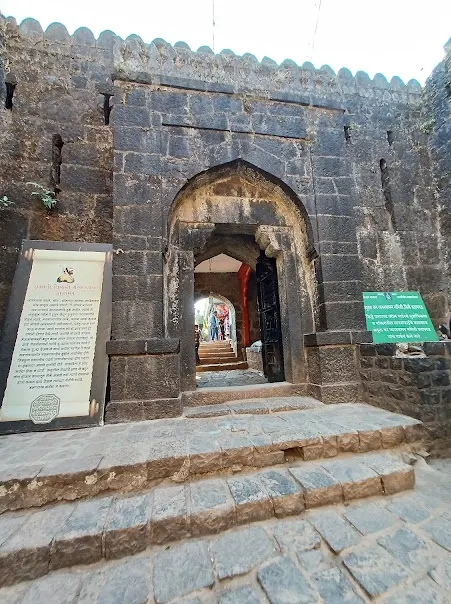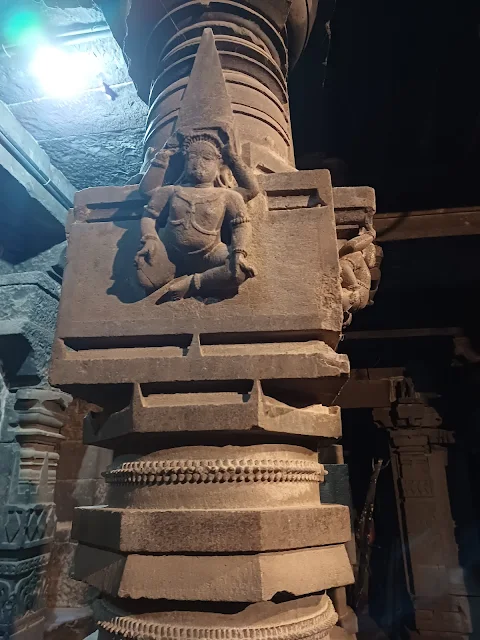Pratapgad is a mountain fort that is located about 20km from Mahabaleshwar near Satara. The fort stands for the history, glory and pride of the Maratha community. 'Pratap' means Valour and 'Gad' mean Fort. The Pratapgad fort tells the story of the bravery of the brave warrior Chhatrapati Shivaji Maharaj.
 |
| Tehlani Buruj (watch tower), Pratapgad Fort |
 |
| Pratapgad Fort from base village |
Shivaji Maharaj built this fort. The height of this fort is 3543 feet above sea level. This is one of the smaller but strategically built fort on top of a hill. The fort is situated at the top of a mountain and you have to climb around 450 steps to reach it.
 |
| Panyache Take (Water tank) at the Fort |
Its a great place if you visit after rainy season. Best time to visit the place is October to March. Be careful while driving as the road from Mahabaleshwar to fort is curvy but its very scenic.
We started our journey around 6.30 am from Pune and reached the fort around 10am after having only a stop at Bhairavnath Misalwale before Khambataki Ghat.
The Pratapgad Fort was built at a strategic location which helped Shivaji Maharaj to keep a check on the activities of the enemy. It was also used as a base for launching attacks on the enemy. Due to surrounded dense forest, no enemy dared to attack the fort.
The fort's historical significance is due to very famous Battle of Pratapgad, which took place here on 10th November 1659, between Shivaji Maharaj and Bijapur Sultanate general Afzal Khan. In the battle Shivaji Maharaj killed Afzal Khan and Khan’s troops had to pay a very heavy price as against defeat. The victory boosted confidence of Maratha soldiers and Shivaji Maharaj doubled his territory within fifteen days of this battle.
History of the fort -
This fort was initially recognized as 'Bhorpya' hill until Shivaji Maharaj completely reconstructed it, which was later recognized as ‘PRATAPGAD’. The Maratha ruler Shivaji assigned Moropant Trimbak Pingle, his prime minister, to undertake the construction of this fort in order to defend the banks of the Nira and the Koyna rivers, and to defend and overlooks the Par pass. Its an important trade route connecting the Deccan plateau with the coastal region. The Fort was completed in 1656.
The Pratapgad Fort remained under Maratha control until 1761 when the British East India Company captured it during the Third Anglo-Maratha War. The British later abandoned the fort, and it fell into ruin. However, it was restored by the Indian government in 1957 and is now a popular tourist destination.
Before starting the climb there is an office where you can pay Rs. 600 and avail guided tour of the fort. The tour covers 12 sights of Pratapgad fort with insider perspective as most of tour guides are local residents of Pratapgad.
 |
| Mahadarwaja (Main Entrance) |
Pratapgad entrance is hidden behind Buruj which looks like wall. This made it difficult for enemy to find out fort entrance from long distance. It lies in between the two bastions. Cannon can be seen placed at this door. After taking a left turn from this door, two other doors are visible but they are not in use any more. Even today the entrance of the fort is opened and closed at sunrise and sunset. A road on the left side of the Watch-tower takes us to the entrance steps of the fort.
This is on the western side of the fort. This fortified place is adjacent to the currently existing vehicle parking bay. This Watch-tower was used to keep an eye on the enemy in the surrounding area.
 |
| Tehalni Buruj (Watch-Tower) |
The fort has a Tulja Bhawani temple from Chhatrapati Shivaji's time. The statue of Goddess Bhavani, draped in a saree, with eight arms (ashtabhuja), sits in the inner shrine. The status was made up of stone which was extracted from a mountain situated at the convergence point of three rivers namely; Trishul Gandaki, Shwet Gandaki and Saraswati. The idol of Bhavani Mata has been carved by Nepali craftsmen.
It is believed that goddess Bhavani gave Shivaji Maharaj her sword, the Bhavani Talwar to fight against Afzal Khan. Infront of the idol, a ‘Shivpindi’ made of transparent crystal stone can be seen. Apart from this, there is the sword of Hambirrao Mohite, Shivaji's main captain credited with killing 600 soldiers from Afzal Khan's army in the battle of Pratapgarh, is also worshipped in this temple.
Just outside the temple, there are two huge stone pillars having rows of lamps, which are called as ‘Deepastambha’. Besides it, there lies an assembly hall (‘Sabhamandap’).
 |
| Canons |
This Hastakala Kendra (a retail outlet of handicraft products) is situated at the fort. There is also a refreshment center located within the campus.
Pratapgad Fort is divided in two parts viz. Lower and Upper Fort. Balekilla or Upper Fort is build as second level of shield in case enemy enters main fort. The upper fort was built on the top of the hill. It is roughly square and is 180 meters long on each side. It is located to the north-west of the fort and is surrounded by cliffs with drops of up to 250 meters.
There are some restaurants where you get tasty snacks. Kanda Bhaji, Butter Milk, Pithala - Bhakari is very popular within tourists. We took a quick stop at a small shack for drinking buttermilk and headed towards Balekilla (mail fort).
The lower fort is about 320 meters long and 110 meters wide. It is situated to the south-east of the fort, which is formed by towers and bastions 10 to 12 meters high.
The fort offers you a mesmerizing view of Sahyadri Mountain ranges.
 |
| Sahyadri Mountains |
Before Balekilla entrance, there is a small temple of Lord Hanuman, which was established by Samarth Ramdas Swami.
 |
| Balekilla Entrance |
 |
| Lord Hanuman |
Balekilla has Kedareshwar (Lord Shiva) temple. Guide told us that shivling is swayambhu and had been found while fort construction was going on.
Opposite to the Kedareshwar Temple there is a place called 'Sadar' where important meetings and discussions used to take place. Local people say Diwan-e-Khas which was darbar of ministers and other officials used to happen here. Diwan-e-Aam, darbar of common people, used to take place on Raigad.
 |
| Kedareshwar |
From Punishment Point (Kadelot), where villainous sorts were put into gunny bags and then dropped from a height of 1,800ft. From here, you can see the Koyna River below.
As we go ahead from Kedareshwar temple, we comes across a huge statue of Shivaji Maharaj mounted on horse-back with sword in his right hand, raised up towards the sky, and bridle in left hand. This statue has been created by Shri. Kamat, a craftsman from Mumbai, on 30th November 1957. This statue was unveiled by Jawaharlal Nehru, then Prime Minister of India.
 |
| Chhatrapati Shivaji Maharaj Statue at Pratapgad Fort |
 |
| Chhatrapati Shivaji Maharaj Statue at Pratapgad Fort |
 |
| We |
Only left leg of the horse is lifted in the air which indicate that warrior's death had not happened in the war. The statue is surrounded by small garden.
There is ‘Yeshwant Buruj’ to the east and ‘Surya Buruj’ near Hanuman Temple to the south and besides it lies a secret-doorway, ‘Rajpaharyachi Dindi’, a place to keep watch-on to the north of the fort.
There is a shop near entrance where they provide Shivaji Maharaj and Maratha Mavla costumes on rent Rs 50 for photograph purpose.
Afzal Khan Tomb is located at the foothills of Pratapgad Fort, is a sign of bravery of Shivaji Maharaj. Shivaji buried Afzal Khan as per Islamic customs and built his tomb here, as per his philosophy ‘once the enemy is dead, the enmity is dead too’. After Afzal khan was killed his head was presented to Rajmata Jijabai at Rajgad fort. Therefore Afzal Khan's tombs are at 2 places, one at Pratapgad and one at Rajgad. Entry to the place is banned due to some political issue.
We left the fort around 1 pm. Our guide told us to have a lunch at Pratapgad Machi near Shivkalin Khedegaon so and we decided to go with his suggestion.
 |
| Pithale Bhakri |
 |
| Bharit Bhakri |
After having lunch, we visited Shivkalin Khedegaon museum. The Shivkalin Khedegaon is on the way towards Pratapgad fort from Mahabaleshwar. Its a realistic depiction of village life and the entire place as been depicted very well. One can imagine how people used to live before hundreds year ago. The art work here is excellent which looks real. It takes 30 minutes to watch the entire place.
 |
| Old Utensils |
 |
| Window |
 |
| Here is the fort! |
We started our return journey around 4 pm and reached Pune around 7.30pm. The fort is worth visiting for its architectural virtues and it is truly incredible place.






































